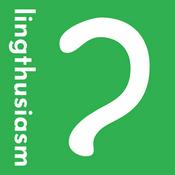In some communities, everyone regularly uses two languages or varieties according to the social situation, with one of them being more prestigious (and more likely to be written down) than the other. This particular kind of multilingualism is known as a diglossia.
In this episode, your hosts Gretchen McCulloch and Lauren Gawne get enthusiastic about diglossia! We talk about why diglossia is the answer to so many questions Gretchen gets asked at parties, what "high" and "low" versions of a language have to do with mountains, where the four "classic" cases of diglossia come from (Arabic, Greek, Haitian, and Swiss), and how at least some of them might not be diglossias anymore. We also talk about whether there are new diglossias emerging (French? English???) and how to tell if you might be in a diglossia.
Click here for a link to this episode in your podcast player of choice: https://pod.link/1186056137/episode/dGFnOnNvdW5kY2xvdWQsMjAxMDp0cmFja3MvMjI2OTg5MjkwMw
Read the transcript here: https://lingthusiasm.com/post/809025308745416704/transcript-episode-113-why-its-a-diglossia
Announcements:
The LingComm grants are running in 2026! If you're working on sharing linguistics concepts with broader audiences or know someone who is, whether in person, online, with kids, through art, video, audio, writing, in person events (or some other idea we haven't thought of!), we have $300USD grants to support your cool project. The grants also include a mentoring meeting with Gretchen, Lauren, and/or an experienced lingcommer who we have personally selected to be relevant to your project.
Applications close on 30th of April 2026, that's the end of April anywhere on earth. Thanks to the generosity of several people we have more grants to give out than we expected, so please apply! Application form and further details can be found here: https://lingcomm.org/grants/
In this month’s bonus episode we get enthusiastic about what we've been up to in 2025 and what's coming up in 2026! Plus, we go behind the scenes on the Lingthusiasm Supporter Wall of Fame: we finally take our Which IPA character are you? personality quiz ourselves and use the results to give you a look into our artisanal process of assigning phonetic symbols to patrons at the Ling-phabet tier.
Join us on Patreon now to get access to this and 100+ other bonus episodes (and get a symbol for yourself). You’ll also get access to the Lingthusiasm Discord server where you can chat with other language nerds: https://patreon.com/lingthusiasm
For links to things mentioned in this episode: https://lingthusiasm.com/post/809024963823714304/lingthusiasm-episode-113-why-its-a-diglossia



